close
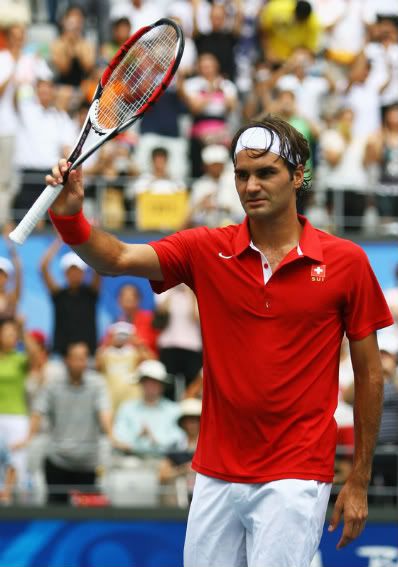
6-4, 6-2
算是輕鬆過第一關了
今天用HiChannel看
沒有廣告 沒有球評~
好像提早半小時打球
聽ptt版友說愛PO吧CH24蠻好的
(選[New!!最新奧運頻道]就可看到CH24;晚上雙打聽說是CH25)
小費進場的時候
介紹小費的時候
小費離場的時候
現場都超大聲的
中途比賽休息
大家還一直Roger Roger的喊 XD
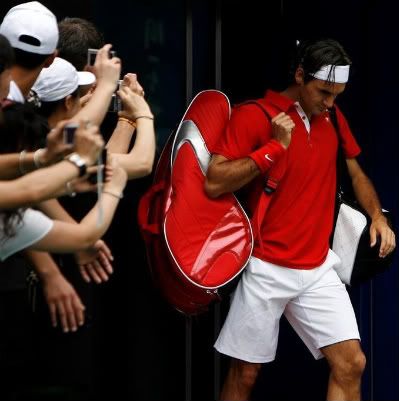
兩盤都是對手先發球
第一盤 小費感覺平平
沒有打得很好
雙方互保發球局各3局之後
來到第7局 對手發球很突然的不順
然後一直雙誤 給了小費3個破發機會
大家也知道 我們家小費 最愛浪費破發點
不過再最後一個破發點的時候
對手竟然自己雙發失誤了
then 小費破發了啊~~~
破發之後 小費好像整個活過來了
也開始上網
最後一局還是被逼成deuce
最後在自己全部保發
一個破發之下
拿下第一盤
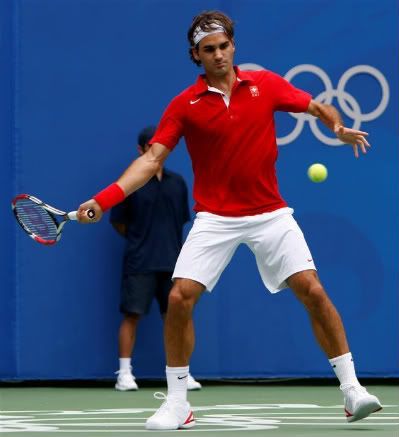
第二盤 對手一開始也是穩穩保發
但是小費變得比第一盤活躍了
不知道是不是因為對手情緒管理不太好
他的表情告訴我 感覺他心中很亂
對手防守力下降
小費連連進攻 正拍 上網 救球
都做得很好~
讓大家驚呼連連 炒熱了現場氣氛了
對手還一直攻小費反拍啊
我超氣的 是來給我們家小費練反拍的是吧
還好小費都有守住
對手最後自己失誤丟分
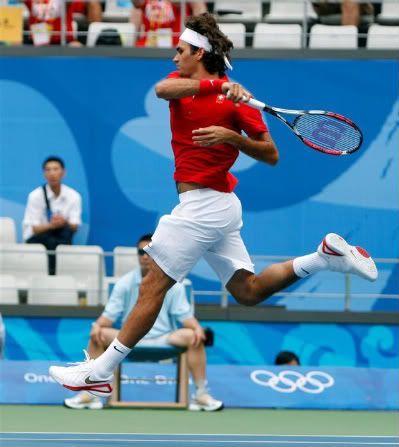
then 在第3局 小費就成功破發了
第五局也是 小費還在最後的一個破發點
如果沒記錯的話 是反拍擊球
大喊了一聲"C'mon"
這是我第一次有聽到他喊ㄝ
之前都會被線審搗亂 分不清楚
這次喊得扎扎實實 現場又很安靜
聽到之後 超high的~ XD
整個激動了起來
我姐還以為小費打贏了
我說再差1、2局
後來小費保發之後 比數5-1
小費本來有機會拿到破發
但對手突然變得頑強
小費最後在自己的發球局
AD-40 一個再見ace
結束比賽!
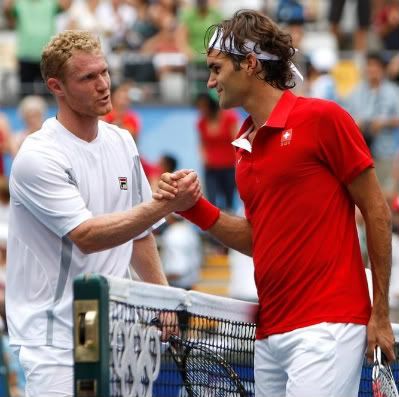
最後一局
現在看起來
小費第一盤就好像在暖身一樣
第二盤真的是打開了
時間總共是1小時05分
非受迫性失誤 第一盤有16個
第二盤只有5個
小費~ 明天我要回學校一趟
可能沒辦法看你比賽了
請好好加油!
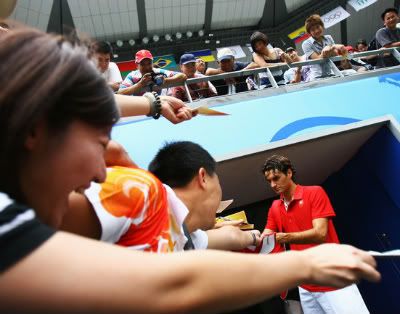
FEDERER Roger (1) / TURSUNOV Dmitry
1st Serve %:62 / 37
Aces: 6 / 3
Service Winner: 4 / 10
Double Faults : 0 / 4
1st Serve Points Won: 28 / 14
1st Serve Points Played: 32 / 17
1st Serve Winning%: 88 / 82
1st Serve Max Speed kmp: 199 / 208
2nd Serve Points Won: 12 / 13
2nd Serve Points Played: 20 / 29
2nd Serve Winning%: 60 / 45
2nd Serve Max Speed kmp: 174 / 212
Break Points Converted: 3 / 0
Break Points Opportunities: 6 / 2
Break Point Conversion: 50 / 0
Net Points Won: 6 / 1
Net Points Played: 8 / 2
Net Points Winning%: 75 / 50
Total Points Won 59 / 39
Winners: 19 / 5
Unforced Errors: 21 / 26
Forehand Winners: 16 / 4
Backhand Winners: 3 / 1
Volley Winners: 3 / 0
丟護腕~
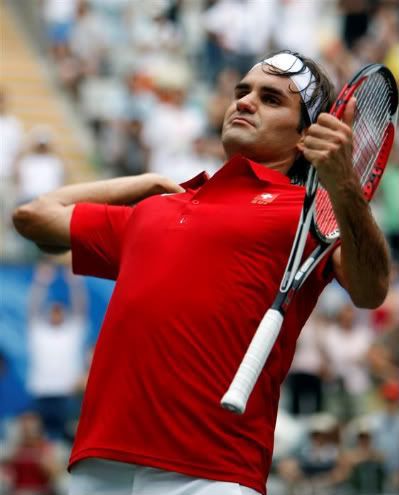
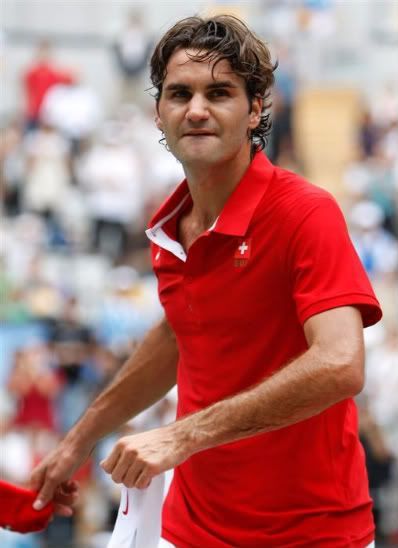
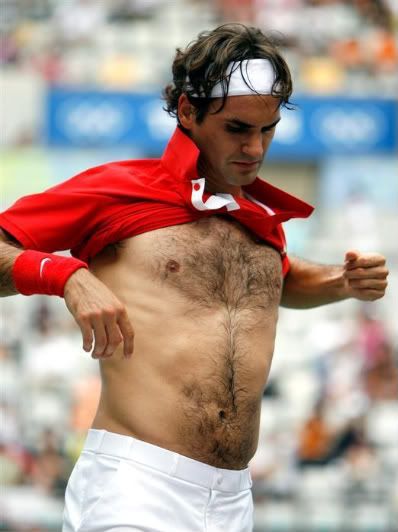
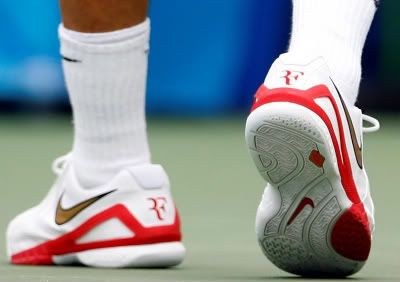
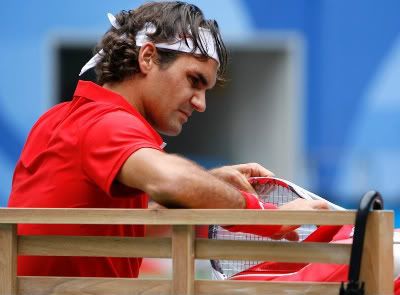
超Man的...
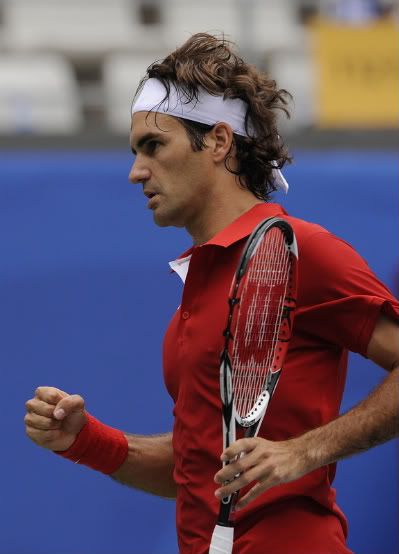
PHOTOS FROM RF.com
***
Federer warns Nadal over ranking battle
Mon 11 Aug, 11:21 AM
BEIJING (AFP) - Roger Federer flew into the Olympics second round on Monday and then warned Rafael Nadal that he was gunning to win back the number one ranking.
Federer hammered Russia's Dmitry Tursunov 6-4, 6-2 as Nadal stuttered against Italy's Potito Starace.
"My goal is to try to get number one ranking back," he said.
"I need to play well again. I need to win the big matches. That's what I'm looking at at the moment."
Federer's record 235 weeks at number one ends on August 18, the day after the Olympic final.
He insisted he wouldn't "freak out" over his losses this season and said he was hatching plans to spend up to 15 years in the top 10.
"You can't keep your ranking forever. I think you have to have a different approach, see what's the next step.
"What I don't like to do because you don't play so well is freak out and have emergency meetings. That's not going to happen."
Federer lost the French Open and Wimbledon finals to Nadal and has since fallen to Gilles Simon and Ivo Karlovic.
Now 27, he said he was reappraising his career to remain competitive well into his thirties.
"Being at the top doesn't mean number one in the world," he said.
"It can mean deep into Grand Slams, you know, being in the top five, top 10 for, whatever, 10 years, 15 years, just be up there and having a shot at Grand Slams."
He added that the Olympics had made it a difficult year with his usual routine disrupted.
"I'm not criticizing. It's just a fact. With the Olympic Games, everything shifted. It made it really hard for us to have proper preparations," he said.
Federer is chasing his first Olympic medal after finishing fourth in 2000 and winning just one match four years ago.
The Swiss will face either Lee Hyung-taik or Rafael Arevalo in the second round.
Nadal, 22, was taken to a deciding third set by the 71st-ranked Starace before winning 6-2, 3-6, 6-2.
Federer has the kinder draw with Nadal facing the prospect of matches against Andy Murray and Novak Djokovic before the final.
The Swiss said his confidence was coming back after last month's shock defeats to Simon and Karlovic.
"You start to doubt yourself just a touch, even though I felt like I was playing well, moving well," he said.
"It's just maybe for me a matter of just getting a bit more time on the hard courts."
***
August 11, 2008
Roger Federer
BEIJING, CHINA
R. FEDERER/D. Tursunov
6-4, 6-2
THE MODERATOR: Questions, please.
Q. Would you say the second set, it looked like you had a real bounce in your legs, confidence, fully restored. Is that the best set you've played since the Wimbledon final in the brief hard court season?
ROGER FEDERER: No, I mean, I thought I played a very good first set against Gilles Simon, where I won 6-2 actually. You know, I was feeling good, playing aggressive and everything.
This was another good set. You know, it's different conditions here. It's pretty quick. Obviously there's also a lot in Dmitry's power, how he wants to keep the score going, because he can serve so well.
I think I played well, you know, hit some great winners, got some good balls back. I really thought, you know, I was playing very solid. That's really what I was expecting from myself today. I'm really happy with the result because I knew the danger against Dmitry.
Q. What is it like to play in this humidity or pollution, the conditions in general? How would you describe that?
ROGER FEDERER: I mean, it is pretty humid, comparing it to other places we play during the year. There's not many places - if any - that are that humid. I don't think today was the hottest day out there. You know, in the preparation week, I thought we had some days that were way more difficult than today.
But it's something that I used to struggle with actually, you know, humidity. Actually, I remember one of the matches I played against Guillermo Cañas back in Canada way back, five, six years ago, maybe six years ago in Toronto. I remember it was brutally hot and I couldn't handle the humidity. That was one of the reasons I wanted to go and practice in Dubai, you know. So we have 45 degrees, a lot of humidity.
Ever since I started doing that, I don't have a problem any more in it, which is key, you know. Because in Switzerland, we don't get heat like this. It's something you better get used to because, especially in the States or in Australia, it can get very hot.
Well taken care of, fit and everything, so today it was not a problem at all.
Q. When you lose a match like you lost to Simon and Karlovic, very close, do you start to just not trust yourself quite so much on the really big points? I'm thinking of the 10th game of the first set where you missed a couple forehands where you normally would have made them.
ROGER FEDERER: I mean, I don't think the problem maybe is on big points. It's just a matter of losing some matches where I feel like I shouldn't of lost. And then sometimes it plays a trick in your mind where you think maybe you're not playing that well actually, but it's actually not the case.
So it's a matter of keeping yourself in a positive mindset. I think it's more than anything else, you know. It's not really on the big points because I don't think you lose those kind of matches maybe on big points.
Maybe Karlovic a little bit more because it's always tight. I mean, you can always win or lose against Karlovic because of that serve. He'll always put you in that position where it's dangerous. That's why you can't overrate a match like that.
But against Simon, I was playing well. I had the match under control. I should have never lost. But, you know, he did well and dug deep. He was, you know, on a roll, winning Indianapolis the week before and everything. He was my first match on hard courts, you know, for a long time.
So, I mean, the positive part is, you know, I got more practice out of those next few days, which maybe usually I would play matches. So that's the positive part. The negative part is maybe that you start to doubt yourself just a touch, even though I felt like I was playing well, moving well. It's just maybe for me a matter of just getting, you know, a bit more time on the hard courts, which I think I did now since I played that first match in Toronto.
Q. You talk about the humidity. What about the pollution as a separate issue? There's been a lot of discussion about it here. How much concern about it did you have coming in? Has it affected your preparation at all?
ROGER FEDERER: I mean, one day maybe, I don't know, I think it was just really, really hot, you know. Maybe that first shock of jetlag and heat and the whole combination, maybe being a bit tired, getting used to different conditions. I think I felt it a little bit.
But then, honestly, when I'm out there, I don't feel, you know, a pollution problem. I think it's more humidity than anything else for us, the players. That's my personal opinion.
Q. I thought I read somewhere that the ranking officially changes with the 11th. I could be mistaken. My question is, in the time that you spent with Pete Sampras last fall on tour, I was wondering if the subject ever came up about when a player who has had tremendous success in winning Grand Slams gets to that point in their career where the ranking becomes less important than the winning of the big events, and therefore the focus shifts, whether it's which tournaments you play, maybe even skipping the way Pete skipped a couple of Frenches. Did you ever discuss that with him or if you've played it around in your head a little bit?
ROGER FEDERER: We didn't speak a lot about rankings in any way. I just think more about, you know, being at the top for a long time. I mean, at the top doesn't mean No. 1 in the world. It can mean deep into Grand Slams, you know, being in the top five, top 10 for, whatever, 10 years, 15 years, just be up there and having a shot at Grand Slams. I think that's what we talked about more, you know, in general, just how difficult it is, but how great it is at the same time.
And I always knew -- I mean, you can't keep your ranking forever. If ever that were to happen, I think you have to, you know, sort of have a different, maybe, approach, see what's the next step. Is it does it come down to the majors? Is it do you want to chase it again? I mean, I know myself, I'm sure my goal is, to try to get No. 1 ranking back, you know, I need to play well again. I need to win the big matches. That's what I'm looking at at the moment.
I always said that every tournament counts for me that I enter. But, obviously, it's not a secret that I base my schedule around trying to have the best preparation for the Grand Slams because this is where the focus is, the biggest, you know, on me. This is where I really want to try to do best.
But this year has been difficult for everybody, having a proper schedule, because we've been forced to play certain tournaments in some ways. I'm not criticizing. It's just a fact. With the Olympic Games, everything shifted. It made it really hard for us to have proper preparations. That's maybe one of the reasons some players play better, some players play worse. And I think next year you can control your schedule much more again yourself, which I think is going to be key for next year.
Q. Since the Wimbledon final in particular, have you at all at any time sat down and questioned whether you have any sort of the fundamental things wrong, like the number of tournaments you play, the way you train, your coaching, that sort of thing? Or do you feel those things are all basically right?
ROGER FEDERER: I've always been doing it. I mean, no matter if I was, you know -- I mean, I've been No. 1 for so long, that obviously this is really when I was most professional, you know. I mean, in the beginning you try to find what works best for you. And once I found that, I think back maybe 2003, 2004, you know, I first just started to do what I did best, play tennis and, you know, have a proper schedule, try to be injury-free.
But I think then once sort of 2004 and '5 came around, I think I always tried to look for new ways to improve, you know. Had a coach. You know, didn't have a coach in '04, that kind of thing. I always look for new ways to improve physically, because mentally, it wasn't a problem any more.
So for me, it was more physically and just, you know, playing. I mean, one of the reasons I started working with Tony Roche was trying to improve my volleys, which I did then.
So I always -- those moments where I sat down with my team and discussed, How can I get better? It's not really something that's gonna change. But the day will come that I will definitely want to sit down and say, What are my next steps, my next goals? What can I improve? You know, because I always think you have to question yourself, no matter if it's good or bad.
What I don't like to do is, sometimes because you don't play so well, is freak out and have, like, you know, emergency meetings. That's not going to happen because, thank God, I was actually doing it already for the last basically three or four years already, which I think was a good thing.
Q. This is your third time to participate in the Olympics. Why do you always come to the Olympics? There's no prize involved and little scores for the ranking and it will affect your other tournaments.
ROGER FEDERER: Yeah, I mean -- okay, I agree. But at the same time, you know, in some ways it's such a nice change to the regular tour we play in, first of all. But then also, being part of the biggest sort of sports event, you know, in the world. Now that tennis is finally, you know, accepted by the Olympic Committee, you know, it's something I wish to sort of, you know, move it forward, you know, in a way.
I guess when I speak to some players now, who didn't used to play the Olympics back in maybe '96, 2000, you name it, I know that some of them have regrets that they didn't play it, seeing how big the Olympics has become, you know, in tennis and how important tennis has become to the Olympics really.
I hope that, you know, by my -- with my presence, and also, let's say, Rafa's presence, you know, Roddick's presence, Hewitt's presence in the past years, I think that's only gonna make it more important for the future generation, as well. So I think that's one of the reasons I play.
But then also having the chance to represent my country is the second one. Third, just sort of living the dream, as well, being part of the Olympic Village, the Olympic spirit. Just being here is something that is quite unique, especially after spending an incredible couple of weeks in Sydney, which for me will always stay in my memories as one of the greatest sports experiences I ever had. It was, for me, clear that I would never want to miss an Olympic Games ever again if I would have the chance to compete in them.
from ASAP Sports
***
Interpreter leaves Federer sheepish
翻譯官讓Federer語無倫次
Aug 11, 5:22 am EDT
BEIJING (AP)—Roger Federer’s timing was a little off Monday at
the Olympics. He easily won, but at a postmatch news conference
he kept stepping on the interpreter translating questions and
answers into Chinese.
Roger Federer在奧運輕鬆挺進,但是在星期一的賽後記者會上和即席翻譯的節奏
搭配卻很不順暢-他一直搶拍,打斷翻譯人員。
Federer milked the situation for laughs, belying his image as a
stoic Swiss.
記者會上因為這樣充滿笑聲,而Federer也給了媒體一個「質樸恬淡瑞士人」的形
象。
Following the first question, Federer and the interpreter began
talking at the same time. Then, he again tried to answer before
she was done translating the question. When she finally finished
he smiled and said, “She answered for me.”
第一個問題問完之後,Federer和翻譯同時回答。(但其實翻譯應該先等
他說完?!)接下來,他企圖在口譯翻完問題之前就回答。當口譯人員終於翻完時
,Federer微笑道:「她都幫我答完了。」
Federer stepped on the interpreter again after the second and
third questions.
問到第三個和第四個問題的時候,Federer又搶話了。
“Excuse me,” he said sheepishly.
「不好意思,」他羞怯的說。
Following the fourth question, he finally had the routine down,
and gestured grandly toward the interpreter as she began to translate.
After another question, Federer leaned into the mike and feigned
speaking as the interpreter began.
第四個問題他終於抓到tempo,翻譯時他還特別向口譯人員做手勢致意。下一個問
題,口譯人員開始翻譯時,他湊近麥克風假裝要說話。
And after the translation of one question, he let several seconds
pass in silence, then looked at the interpreter with a grin.
記者會中,口譯人員翻譯完某一個問題時,Federer停頓了幾秒鐘,然後對著口譯人
員展現燦爛笑容。
“Just giving you time,” he said.
「只是給妳一點時間(休息? 不是很確定),」他說。
Despite being lost in translation, Federer was in a good mood
because he successfully began a bid for his first Olympic medal
by beating Dmitry Tursunov 6-4, 6-2.
Roger面對口譯雖然摸不著頭緒,但是在奧運奪金之旅首戰告捷讓他心情大好。對Dmitry
Tursunov 6-4, 6-2輕鬆晉級。
News from Yahoo
翻譯 from PTT
感謝PTT版友Amandaya、VickyLiao
小費之前的訪問影片
全站熱搜


 留言列表
留言列表